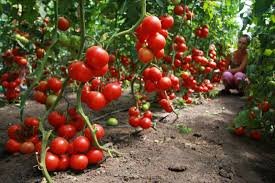Khachmaz, July 31 — What was expected to be a triumphant season has turned into a bitter ordeal for tomato farmers in Azerbaijan’s Khachmaz region. A record-breaking harvest of high-quality tomatoes has flooded the local market — but instead of profits, it’s brought mounting losses.
At the start of the season, when tomatoes first hit the stalls, prices hovered around 50–60 qapiks per kilogram — relatively acceptable. But within weeks, the market collapsed. Today, prices have plummeted to as low as 20 qapiks per kilo. Large crates of tomatoes that once sold for 10–15 manats are now struggling to find buyers even at 5–6 manats.
“These prices don’t even cover our basic production costs,” one farmer told Oxu.az.
“Last week we were selling at 40–50 qapiks per kilogram. Now it’s 20–30, and the processing plants are offering just 15.” He added that many farmers have simply abandoned their harvests. “Tomatoes are rotting in the fields. Some don’t even bother collecting them anymore. Consumer demand has dropped too.”
Another farmer echoed the frustration: “We poured our hearts into this harvest. But the prices don’t reflect the effort at all. Two manats per crate — that’s not even enough to pay the workers who pick them. Let alone the money we spent on fertilizers, pesticides, and upkeep.”
Even resellers are feeling the squeeze. Seymur Sultanov, a tomato trader, broke down the economics: “We buy a crate for three manats and ship it to Baku. With transportation, our cost is five manats. And we sell it for the same five. So we’re making nothing.”
Meanwhile, regional processing plants are overwhelmed. Queues of up to 100 trucks loaded with tomatoes have formed at factory gates — with many farmers seeing this as their last hope to recoup a fraction of their investment, even at rock-bottom prices.
Ironically, this crisis unfolds against the backdrop of strong national export figures. In 2024, Azerbaijan exported 145,600 tons of tomatoes, generating $175.4 million in foreign currency earnings. But that success hasn’t trickled down to the fields of Khachmaz, where surplus and market saturation are turning abundance into anguish.


